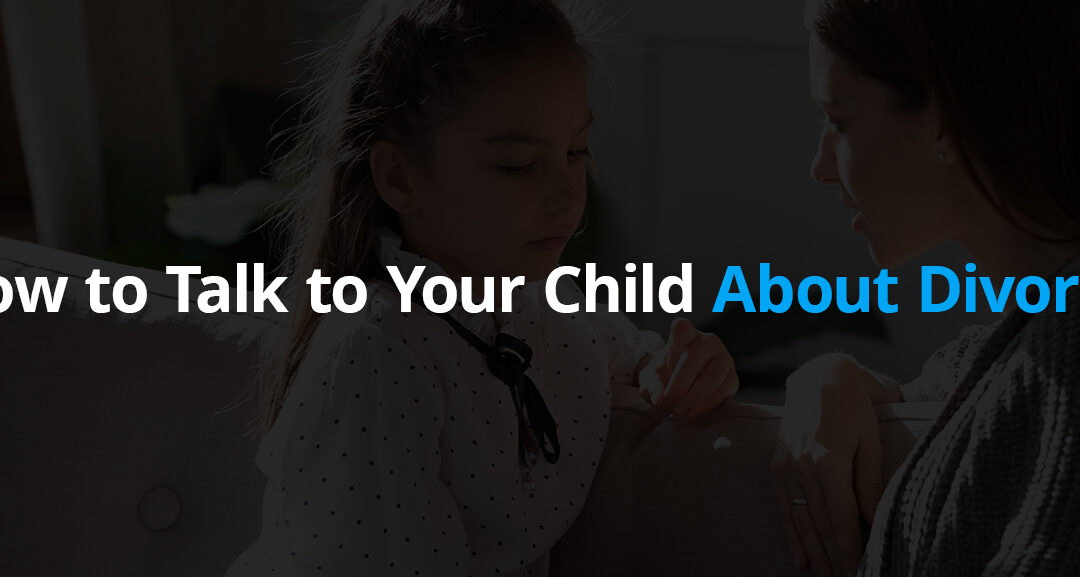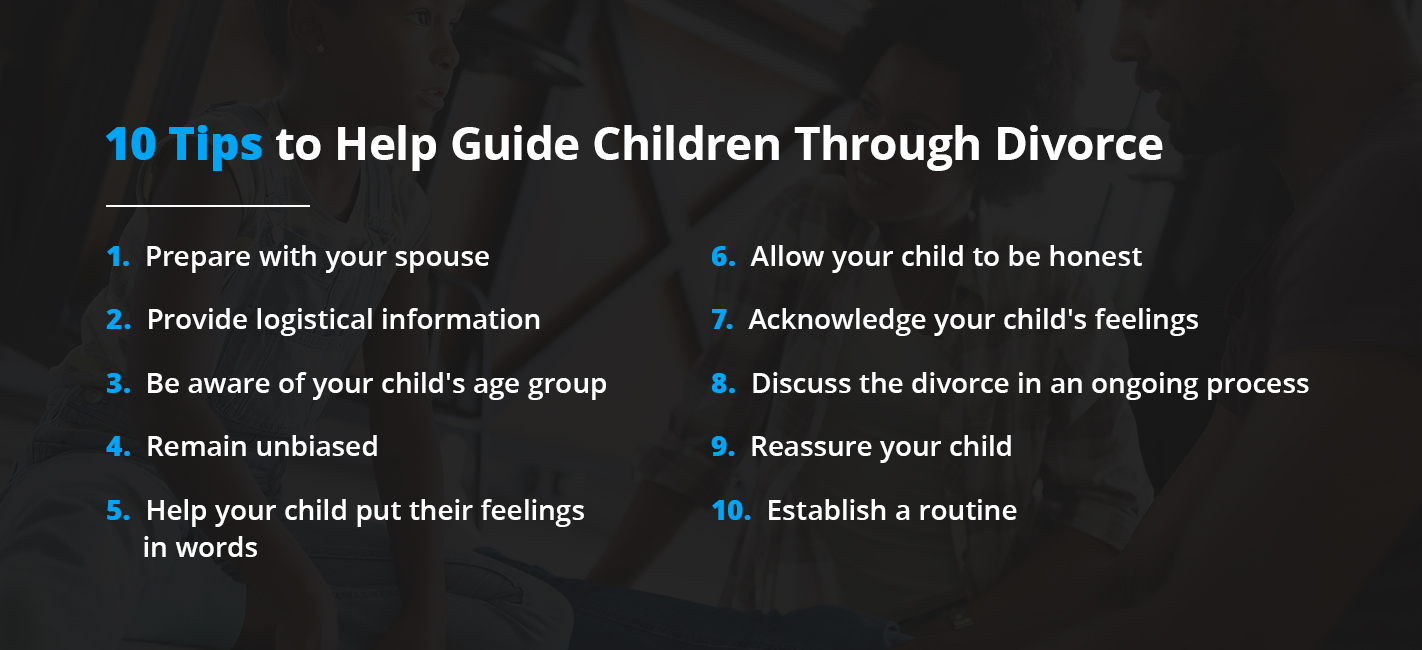No one wants to go through a divorce, but going through the experience with children can be particularly daunting. A parent’s divorce can be a shocking, confusing, frustrating, stressful and sad time for children, though a child’s reaction depends on their personality, age and the circumstances surrounding the divorce. However, there are ways to help children cope with the feelings and stressors of a divorce. Your children may even come out of the situation better equipped to handle stress and grow into more tolerant, flexible adults. We have developed this guide to help you tell your child about divorce and cope through the process.
How to Tell Children About Divorce
Before you tell your child about the divorce, you may want to prepare what you’ll say. Deal with the anxieties you have about the situation, plan what you will tell them and anticipate tough questions from your child so you will be better able to help your child cope with the news. Try to address the most crucial discussion points first while using an empathetic tone. Aim to give an age-appropriate, honest explanation.
- Address the changes: Anticipate your child’s questions about how their life will change due to the divorce. Acknowledge aspects that will be different and the parts that will stay the same. Let your child know that you will deal with every change together throughout the process.
- Be honest: Your kids deserve to know why the divorce is taking place. However, you may want to avoid giving long-winded, complicated reasons that could confuse them. Choose simple, truthful reasons, such as citing your and your spouse’s inability to get along anymore. Remind your child that even though parents may not always get along, parents and kids never get divorced or stop loving one another.
- Tell your child you love them: Reminding your child that your love has not and will not change can be a powerful message during a challenging and confusing time. Let your child know you will continue caring for them in every way you do now, from helping them with their homework to reading to them before bed.
If possible, ensure both you and your spouse are present for this conversation with your child and leave out any feelings or words of blame, anger or guilt.
Divorce’s Effects on Kids of Different Age Groups
When you are going through a divorce, effects on kids can range depending on their age groups. Knowing what stage a child is in developmentally can help you better understand how to help them deal with the divorce and adjust to this new reality.
Babies
In infancy, a child can still feel the tension in a home and between parents, even if they can’t understand the reasons behind the conflict. Babies can become clingy and irritable if the moodiness continues, particularly around new people. Babies seek comfort in routine and familiarity, which means you may want to maintain your typical daily routine during and following the divorce, especially when it comes to meals and sleep. Give your child security items and favorite toys, and spend more time offering them physical comfort.
Toddlers
During a child’s toddler years, their primary bond is with you and their other parent, so major disruptions in home life can be challenging for toddlers to understand and accept. At this age, kids can believe they have caused their parents’ divorce and may need more attention. If you can, ensure that you and your spouse work together to create a routine that your child can follow easily. Spend quality time with your toddler and give them extra attention.
Preschoolers
For kids, divorce during their preschool years can be uniquely challenging. A preschooler may not yet understand the concept of divorce and will not want you and your spouse to separate, regardless of the tension in the home. Similar to toddlers, a preschooler may believe that they are responsible for your divorce. They may feel uncertain about the future, bottle up their anger or have nightmares. If you are the parent of a preschooler, be as open and positive about your divorce as possible, as this will influence how your child feels about it. A preschooler may need someone to discuss their feelings with and may respond well to books about divorce. Establish a regular schedule and ensure you stick with it.
School-Aged Children
If you have a younger school-aged child, they may feel like you are divorcing them, and they may worry about losing a parent. A child in this age group may even hope they can save the marriage. Older children may blame one of the parents for the divorce and align themselves with the other parent. School-aged children may experience headaches or upset stomachs and lie about symptoms to stay home from school. Some may lash out, and some may become withdrawn and anxious. To help school-aged children navigate a divorce, ensure each parent gets to spend quality time with them, encourage them to be open with their feelings and allow them to get involved in extracurriculars.
10 Tips to Help Guide Children Through Divorce
When guiding your child through divorce, it is crucial to be honest with them and not be critical of your spouse, even after hurtful events like infidelity. Follow these tips for helping a child with divorce:
- Prepare with your spouse: If possible, come to an agreement with your spouse on an explanation for the divorce and stick with this explanation throughout the process. Plan what you’ll say and when to broach the topic, and ensure you have the discussion with your child when both parents can be present.
- Provide logistical information: While you don’t need to overwhelm your child with the details, you may want to let them know about logistics, such as changes to their living arrangements, activities and school.
- Be aware of your child’s age group: Generally, a younger child will need fewer details and understand a straightforward explanation. On the other hand, an older child may need more information.
- Remain unbiased: While discussing the divorce is important, parents should do their best NOT to disparage or criticize the other parent in front of the children. This puts the children in an uncomfortable position, and can often lead to the child feeling in the middle or cause other various problematic behavioral changes.
- Help your child put their feelings in words: A child may struggle to express their emotions, and you can help them by noting their mood and encouraging them to say whatever is on their mind.
- Allow your child to be honest: Your child may hesitate to share their genuine feelings for fear of hurting you, so reassure them whatever they need to say is OK. If your child bottles up their true feelings, they may struggle to work through them.
- Acknowledge your child’s feelings: Though you may not be able to change your child’s feelings of sadness or fix their problems, you can acknowledge their emotions and give them time and space to work through whatever ups and downs they experience. Show that you understand how they may be feeling, which can make a child more comfortable.
- Discuss the divorce in an ongoing process: As your child grows, they may have more questions, concerns or feelings about the divorce. Be open to discussing it with your child whenever they need to.
- Reassure your child: Reassure your child that they are not responsible or to blame for your divorce and that you will continue loving them. Do so as often as necessary.
- Establish a routine: Establishing patterns can add structure and stability to your child’s daily life, especially if several changes have occurred. Routine can help your child feel more secure and safe, as they know what to expect every day.
Seek Counseling for Yourself, Your Child or Your Family
At Merrimack Valley Psychological Associates, we help kids coping with their parents’ divorce. Our goal is to help our clients with their mental health and improve their relationships with themselves and their loved ones. Therapy can help you develop healthy communication skills for sharing your feelings. If you or your child are struggling during a divorce, you don’t have to deal with it alone. Our team of clinicians offers counseling services for adolescents and adults in times of change and loss, including in-person and teleconference therapy. Schedule an appointment with a clinician at Merrimack Valley Psychological Associates to learn more about helping kids through a divorce.
Reviewed By
Dr. David Rainen, PsyD.
I am a licensed clinical psychologist with an extensive background treating a variety of different ages, situations, emotional and mental health disorders in individuals and their families. As part of my 10 year professional and training career in psychology, I have developed and refined my skills and approaches through my work in a variety of diverse settings including: hospitals, community outpatient facilities, college counseling centers, secure and unsecure inpatient/residential treatment programs, and therapeutic day schools.




